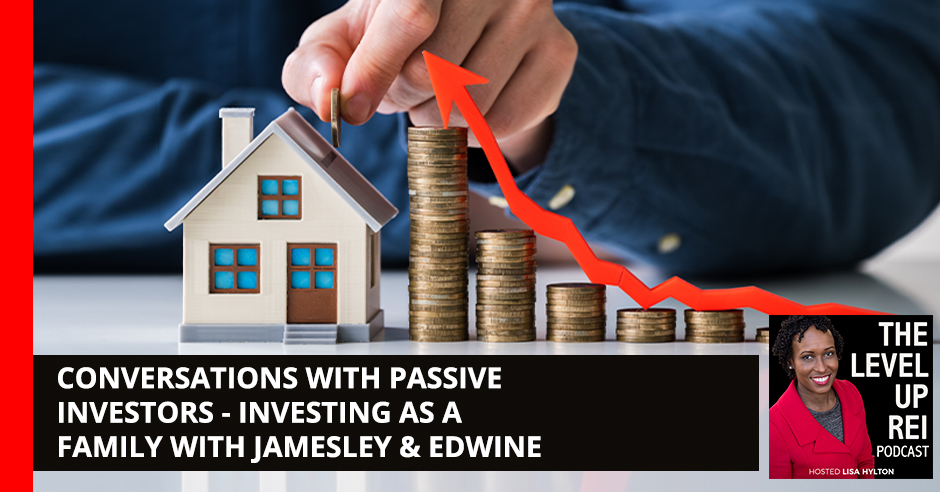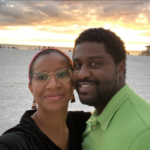
Are you one of those people who find that they have less time to spend actively investing in real estate because of their growing family? If you are, then this episode is for you. Listen in as Lisa Hylton brings in Jamesley Dasse and Edwine Alphonse, a real estate investing couple who live in Boston with their two beautiful daughters. Jamesley and Edwine invest in real estate both actively and passively, but it was the passive aspect of the business that was a real life saver for them when they had their hands full raising their kids. They still continue to invest both actively and passively now and are always hungry for more opportunities to learn and grow. Together, they share some of the biggest lessons they learned along that journey.
—
Watch the episode here
Listen to the podcast here
Conversations With Passive Investors – Investing As A Family With Jamesley & Edwine
This is a part of my series on Highlighting Experiences: Having Conversations With Passive Investors. I am excited to have two friends of mine on the show. They not only passively invest, but they are also active investors. I’m excited to share their stories about their journey to passive investing with you. Jamesley and Edwine live in Boston, Massachusetts, raising their beautiful 3-year-old and 6-year-old daughters.
A few years ago, they started to research financial independence strategies and concluded that real estate would be a primary vehicle to help them in building generational wealth for their family. Since then, they have actively and passively invested in real estate, primarily out of state deals. In addition to their primary residence, they have two single-family residences in Florida, one triplex in Rhode Island, and they’re also passive investors in syndication of a 250-unit apartment building in Atlanta. They are focused on improving their financial education and plan to invest in more syndication and acquire more investment properties in the future. Welcome to the show, Jamesley and Edwine.
Thank you for having us, Lisa.
This is such a treat. It feels like coming full circle. You can remember when I sent you a snippet video of when I got my mic and I was like, “I’m getting ready to podcast.”
You talk about that since the beginning. Finally, I can be in your show and we can have conversations.
This particular episode is focused on passive investing, but we can touch on some of the active stuff that you do because I know that you guys are active people as well. In your bio, I touched a bit about how you got started many years ago. I wanted to touch back on how you invest in real estate these days.

Investing As A Family: You don’t have to be super-rich to join a syndicated deal. You only need to have some money that you don’t need for the next 3-6 months.
We are involved in a variety of things with real estate. Maybe it’s the fault of the internet age that we’re constantly bombarded with lots of different ideas of how you can get involved in real estate. We’re always like, “We want to touch on this. We want to touch on that.” We started off with a single-family home purchase and wanted to rent it out. The experience we got with that was that it was a lot of work, even though it was remote and we had a manager. We started talking about, “Do we want to continue down this road, managing properties, especially even remote, or do we want to go more passively where we have a little bit more time?”
At that time, we had one daughter and then we had our second daughter just born. We started realizing that we didn’t have as much time to invest in real estate as we thought we did. We started thinking about how else can we stay involved in real estate investing, but not being buyers of properties that we didn’t have to manage. We started going down the road of, “What other options are there besides actively investing in real estate?” That’s when we started learning about REITs, eREITs, patients, and things like that.
How did you particularly run across syndications and REITs? Was it primarily from your own passive reading and researching online?
We did a little podcast talking about syndications and different types of passive investment in real estate. We did most surgeons syndication, and we have friends that were involved in raising money for syndication. We connected with them and they presented a deal to us. Also, we send them the money right away. We did due diligence and that’s when we decided that it was the best thing for us to invest at that time.
Diving into that, because these episodes here on conversations with passive investors are to help people who are thinking about coming into the idea of passive investing. Some of the things you touched on there, due diligence, BiggerPockets, listening to podcasts. What were some of the key things that you looked for when making the decision to invest passively that you would share with someone who’s thinking about investing?
The first thing that we went down the road as we have enough money to invest, listening to syndications and things of that nature. We thought that, “This is only for super-rich, celebrities, and people like that. It wasn’t accessible to everyday people who were looking to invest their money.” We found out that maybe we were wrong, there are opportunities for us, but we ourselves have to make the determination whether we had the passive money that was available that we didn’t need in the next 3 to 6 months. Therefore we could invest in this deal. We didn’t need it in the next 3 to 5 years for syndication deals. Therefore, we could invest in one of those types of deals as well.
The same is the return on investment. What are we going to get if we go into that deal? Are we going to get more if we invest in the stock market? Are we going to get more if we put our money there, earning interest in our bank accounts. We usually look for something that guarantees more than 8% of cash return on an annual basis, and makes sure that the market makes sense. Someone who’s investing in a market where nobody wants to leave. That makes sense to us. We’ve been investing in Florida, Jacksonville, Tampa or some other place that we would be interested in looking at these locations. The other is workplace experience and qualifications on the deals. If they have that experience doing that deals before, we felt more comfortable giving them our money.
That ties me now onto the next question, which is, have you had any passive investing horror stories and what you’ve learned from that experience?
It’s still early going. We have more horror stories with the stock market than we do with real estate.
It’s like more horror stories of single-family homes.
Our active side of real estate has been more challenging than the passive side. For all intents and purposes, the hard part is doing that due diligence, the right person to invest with. When I say person, the keys that we’re looking for is that the person we’re investing with has knowledgeable experience and all those things. We trust that we can give them our money and will have a return. So far, everything’s been going exactly as they had promised with returns. We had the COVID situation come up where everybody was wondering, “Would we continue to receive rents?” Over on the active side, we were concerned about that. So far, the company we invested in has been strong.
Even when you think you’ve achieved your goal, there’s always more to it beneath the surface. You need to keep leveling up. Share on XMy next question to you is based on what you said. This leads perfectly into it. The beautiful thing about you guys is that you have experience on both sides. You continue to be active and you continue to look to acquire properties that you’ll continue to actively manage both near you and far away from you. You’re also still open to passively investing and half passively invested in the past. Coming from that experience, what can you share with someone in terms of what you see as the pros and the cons of choosing each path.
If you’re an active investor, you need to have time because it does require a lot of time to manage properties. Even if you have a property manager, you still have to answer questions. You still have to think, “They’re calling me about termite or funds to do termites repairs.” Do I have time to do research about termites? Do I have the time to research contractors? There’s still a lot of time involved in managing properties, whether they close or defer
The second thing is you need to trust people. You need to trust your property manager, tenants, contractors, and anybody that’s going to be in contact with the property. That’s one person that can create real damage. That’s a con. The pro is you have full control. I like to have control sometimes. For example, we got some new tenants for one of our units and I enjoy the experience of interacting with people applying for the unit. I had control in choosing who my tenants were going to be. That’s a pro for me. The good thing is all the deductions you can get.
Seeing all of that, we were thinking we need to have a balance. We want to continue to invest in syndication deals because the passive nature of it allows us to not think about it. Once you’ve trust the company, the partnership that you’ve gone down and you said, “We’re going to give you our money. The things that you said you are going to do, please deliver on it.” That’s the end of thinking for us. It’s similar to having a savings account. You put the money in the savings account, and then you say, “The bank hopefully will continue to give us at the end of every month. There’s a lot less effort that goes into it from our perspective.” I wish we had known more about all these different opportunities that were present at the beginning of our journey. We might have accelerated investments so that we could have gotten a lot more traction on the syndication side, had we known that we needed to be an accredited investor, for instance. We didn’t know that at the beginning.
This is a bonus question, thinking about syndications. Would you say that it takes a little bit more capital to get into syndications than it does to start actively purchasing properties on your own, given your experience?
It’s a little bit less. It depends on the location that you’re investing in, but for us in Boston, it’s significantly less. With the syndication deals, $25,000 or $50,000 could get you started in one of those opportunities, whereas to buy a property in Boston, you’re talking about at least $100,000 to start. It’s all about your market where you’re looking to invest. We felt it’s a little bit easier to get into from the liquidity side, just from the perspective of, “Are you qualified?” You need to have pre-existing relationships with somebody, or you have to be an accredited investor in order to get approached with a syndication deal. That was the part that we didn’t know at the beginning.
Other passive investors are thinking about the part of trying to find an operator, trying to find that person that they feel they could make that investment in. Any keys around that, any advice you could give around how they could go about finding those good contacts?
Once you get into a syndication, you’ll be pushed to get into many more. The first step is to get the first one. To get the first one, you need to do a lot of research and get to know people. Sometimes it’s challenging to get to know people and to do research, but we have the internet, podcasts, we have materials. The first time is to get through the first one. To get the first one done, there are a lot of people who are providing free education. You can listen to a good podcast. If you like the person and you like what they shared, contact the person, email them, ask them questions, go on their Facebook group or their webpage. Put your email there. Once you put your email there, you will start getting more education, more materials. If you read something that you like or don’t like, you know that, and leave your comments, ask for a phone call and conversation. That’s where you put most of your time because once you’re in, I can see you looking like fireworks. You will get more opportunities to participate in these types of deals.
The last bonus question before I get into my level up questions is one, you guys are married, you have kids, and you’re still choosing to invest in real estate. You’re doing it actively and passively. I’m sure someone who’s reading is probably in your shoes. They’re also married. They also have children. They also have that desire but don’t know maybe how to navigate or how to do it. What advice would you give to other married couples who have children, who want to invest in the path that you’re doing?

Investing As A Family: Once you get into a syndication, you’ll be pushed to get into many more. The first step is to get the first one.
The ideal situation is where you can use the experiences and knowledge of your partner to work on these different investment opportunities that present themselves. We both have different strengths and we can rely on each other to go down that road. I like to get hands-on and involved in things. She likes the centric side of things, interacting with people, talking and getting to know people beforehand. That’s the position that allows us to see a wide array of opportunities that are out there. I think that helps.
If you’re the kind of person who’s going out there by yourself, maybe now I was going by myself and she got her own ideas of what she wanted to do for investment, it allowed us to go down that avenue of what is it that we’re interested in, and then come back to say, “What do you think about this?” We explain it. If you could teach somebody that, “If they know, you know it,” then at that point, it becomes a lot easier. You start saying, “Since we both agreed on this, I think this makes sense that we should continue down this real estate path as opposed to stock markets or buying collector cars or something.”
You need to have those same long-term vision. Wins is to create long-term wealth, assets, and wealth for family by working on your goals, working on your visions, what do you want to achieve, and why you’re doing this. Get into the same page of in 5 or 10 years, this is what we want to do, you can get into it first. It helped us that we were able to talk and write these goals and discuss them. We always focus on that.
Lastly, advice for when things don’t go as planned and how you guys continue to work together to find solutions to move forward?
We always find place for when things will not work out. Nothing is ever perfect. Always think about the lesson learned. It’s like, “What did we lose?” We always have the experience for it and it can be challenging and painful to lose money but at the same time, we learn so much money experience and we learn what not to do in the future as well.
We get to the level up questions. These are my questions I ask all my guests. The first one is, what are you grateful for in your life?
I’m grateful for being in good health. We are in good health. In the age of COVID, this is something that we should all be grateful for.
What has attributed to your success and continuous growth?
It’s resilience. We have our ups and downs, and the idea is that the downs are going to come. We are here on this earth with obstacles and hurdles that are always going to come in and present a challenge to us. The key is to keep going. If you have your goal, keep going after it, even when you think you’ve achieved that there’s more to it than the surface level of what you’ve scratched. You want to keep leveling up.
What do you now know that you wish you knew at the beginning of your journey?
I wish we had known more about real estate. The first investment that I made with Jamesley was our primary home. At that time, we didn’t know a lot about real estate. I wish I already knew about real estate at that time. I wish I knew more about syndication, the different types of assets that people can invest in. I wish I can talk to people and ask them any questions, and the other resources that we can get, that we can read and educate ourselves. Sometimes we see things and we talk about it, but we never took action. I wish we had more ways to do it.
The key part about the deep dive on real estate, I wish we had known more at the beginning was that there was a bunch of opportunities that presented that we didn’t know were available to us when we were buying home. The money we use for our home, we could have purchased a multifamily as opposed to a single-family. We could have invested in a syndication deal and the investment property, because we were thinking about our specific market in Boston and how expensive it was. We need to buy now because the price might go a little bit higher or rents were going up versus what other opportunities were there for us. We just didn’t know.
The good thing is there are many other ways you can invest in active and passive as well. You can invest in multifamily, storage units, and building offices. There are many things that we can get into with no many more actions. We wish we had that knowledge many years ago.
Since you brought that up there, do you think about investing in other things other than just apartments?
Yes, I do. Jamesley has been looking at notes and I’ve been looking at storage units and mobile home parks. We are doing research. We’re also looking at syndication because we like syndication. I would suggest people to explore what’s available that would fit your lifestyle. You can do syndications. Try to find a way where you can match what you like and invest in opportunities.
I’m happy you guys came on the show. I appreciate it. If my readers want to reach out to you and connect with you, what is the best place that they can do that?
We are on BiggerPockets through Edwine‘s account. Look us up there. You can reach out to us via email. That’s the easiest way, EJConcordRE@Gmail.com.
Thank you so much.
Important Links:
- EJConcordRE@Gmail.com
- Jamesley Dasse – BiggerPockets
- Edwine Alphonse – BiggerPockets
About Edwine Alphonse
 Jamesley and Edwine live in Boston MA raising their beautiful 3 and 6-year-old daughters. 5 years ago, they started to research financial independence strategies and concluded that real estate would be the primary vehicle to help them build generational wealth for their family. Since then, they have actively and passively invested in real estate primarily in out-of-state deals.
Jamesley and Edwine live in Boston MA raising their beautiful 3 and 6-year-old daughters. 5 years ago, they started to research financial independence strategies and concluded that real estate would be the primary vehicle to help them build generational wealth for their family. Since then, they have actively and passively invested in real estate primarily in out-of-state deals.
In addition to their primary residence, they have 2 single-family residences in Florida, one triplex in Rhode Island. They are also passive investors in the syndication of a 250 unit apartment in Atlanta.
They are focused in improving their financial education and plan to invest more in syndications and to acquire more investment properties.
Love the show? Subscribe, rate, review, and share!
Join The Level Up REI Podcast Community today:

Recent Comments